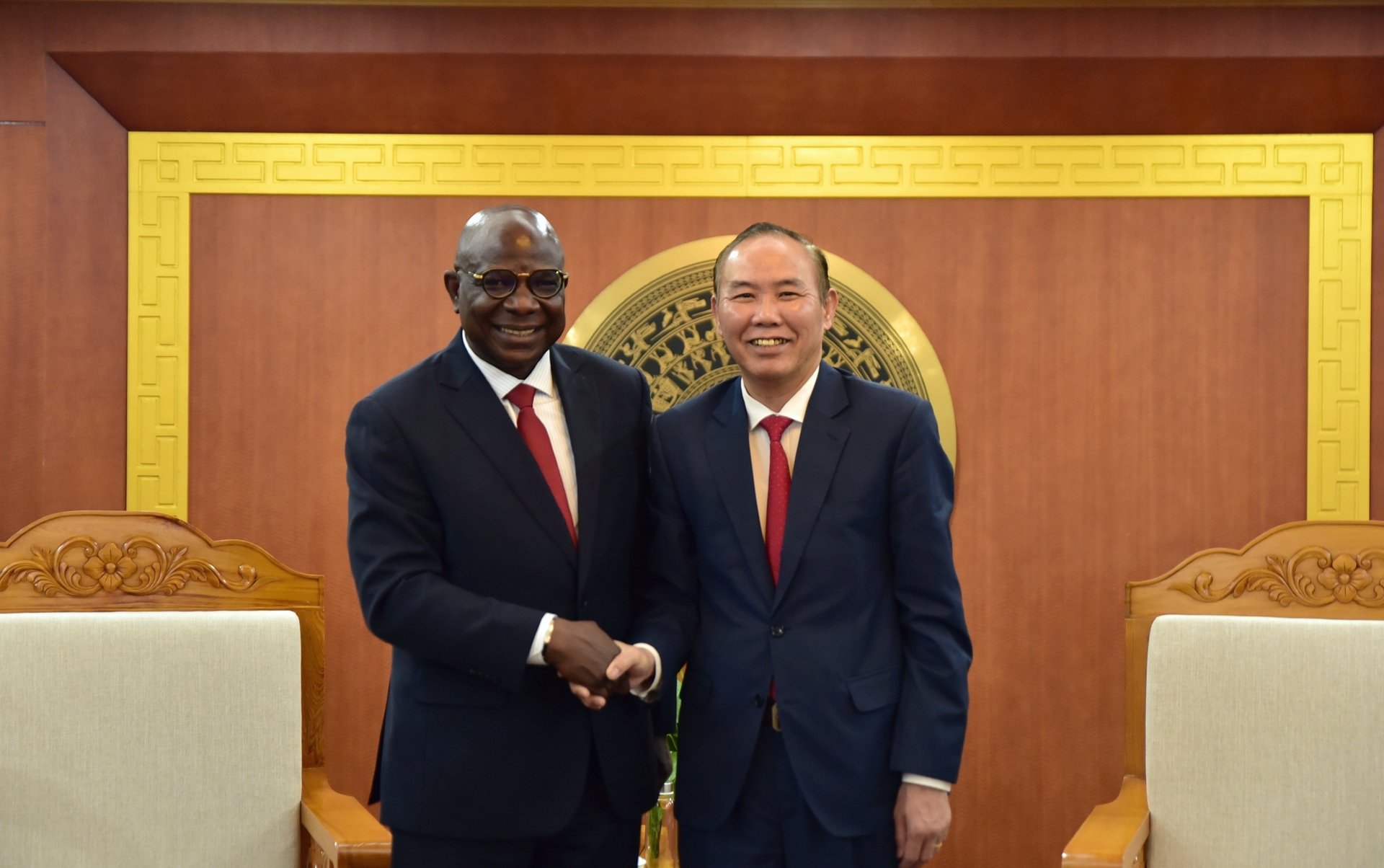December 18, 2025 | 21:47 GMT +7
December 18, 2025 | 21:47 GMT +7
Hotline: 0913.378.918
December 18, 2025 | 21:47 GMT +7
Hotline: 0913.378.918
The meeting between the Ministry of Agriculture and Environment and the World Bank (WB) aimed to update the progress on the completion of the Mekong Delta Integrated Climate Resilience and Sustainable Livelihoods (WB9), the preparation progress of the Vietnam Coastal Disaster Resilience Improvement Project (WB10), and the Mekong Delta Climate Resilience and Integrated Transformation Project (MERIT-WB11).

On the afternoon of March 27, Deputy Minister of Agriculture and Environment Phung Duc Tien welcomed and worked with Mr. Africa Eshogba Olojoba, Practice Manager, Environment, Natural Resources, and the Blue Economy, East Asia and Pacific, World Bank. Photo: Kieu Chi.
In June 2024, the WB9 project was completed and assessed to have achieved its objectives. The invested projects have been effective in transforming local livelihoods. Based on the achieved results, the Ministry of Agriculture and Environment and localities in the Mekong Delta proposed that the WB continue to invest in the MERIT-WB11 project through integrated approaches, promoting coordination between the central and local levels, and transforming production models to suit regional characteristics.
Welcoming the WB delegation, Deputy Minister Phung Duc Tien emphasized that the Ministry of Agriculture and Environment is consistent in using loan capital to develop fisheries infrastructure. Vietnam's aquaculture has always received support from the Government, particularly Decision No. 1664/QĐ-TTg approving the Project on developing marine aquaculture to 2030, with a vision to 2045.
In 2024, the total aquatic product output reached more than 9.6 million tons, with seafood export turnover reaching more than USD 10 billion. The potential for sustainable aquaculture and marine aquaculture development is still very large, with 1.3 million hectares of aquaculture area, large deep-water lakes, and vast sea areas.
However, current aquaculture production has not fully exploited its available potential and advantages. The marine aquaculture industry is still backward and needs to invest heavily in cage systems, breeds, farming and processing processes for sustainable development and larger scale.
According to Deputy Minister Phung Duc Tien, the Mekong Delta is considered the country's seafood, fruit and rice granary, and is currently heavily affected by climate change and saline intrusion, threatening people's livelihoods. Without effective response solutions, maintaining stability and developing the country's agriculture will face major challenges.
"Three projects in cooperation with the WB play a particularly important role in the agricultural sector of Vietnam", affirmed the leader of the Ministry of Agriculture and Environment. Currently, the pre-feasibility study and the environmental and livelihood assessment for the WB11 project have not encountered any major obstacles, and have been basically completed. The parties need to proactively remove difficulties to ensure the implementation process takes place promptly and effectively, no later than March 31.
Following the Deputy Minister, Mr. Africa Eshogba Olojoba - Practice Manager, Environment, Natural Resources, and the Blue Economy, East Asia and Pacific, WB - congratulated the Ministry of Agriculture and Environment on its rapid establishment and effective operation. He thanked the Ministry for its active support, and affirmed the WB's commitment to accompanying and promoting projects to support construction works and ensure the livelihoods of people in the Mekong Delta region.
Mr. Africa Eshogba Olojoba highly appreciated the progress of the two current projects and hoped that the merger of the Ministry would help speed up the approval process of the project report. The WB hopes to continue to strengthen and develop an effective cooperative relationship with the Ministry of Agriculture and Environment in the coming time.
Informing Mr. Olojoba, Deputy Minister Phung Duc Tien said that the merger of the provinces would not affect the progress of the WB projects being implemented in the Mekong Delta region, because the provinces are basically within the common objectives of the project.
The leaders of the Ministry of Agriculture and Environment recommended that the WB continue to mobilize experts to support the Ministry as well as the provinces in the Mekong Delta in the process of preparing project documents, combining to find non-refundable aid sources, thereby helping the provinces carry out non-construction activities within the scope of the project.
The MERIT-WB11 project was approved by the Prime Minister under Decision No. 233/QĐ-TTg dated March 18, 2024. The project consists of three components:
Component 1: Strengthening institutions and information systems.
Component 2: Investing in climate-resilient regional infrastructure.
Component 3: Promoting livelihood diversification and climate-adaptive rural economies.
Progress on the preparation of the pre-feasibility study report: Consultants have been mobilized to develop the report, which is expected to be submitted to the Ministry for approval in June 2025. The Ministry of Agriculture and Environment will provide guidance for reviewing and conducting internal consultations, particularly on non-structural activities, to ensure alignment with project objectives.
Translated by Kieu Chi
/2025/12/17/0042-2-075234_14.jpg)
(VAN) In Vinh Long, high-quality, low-emission rice models are being scaled up from cooperatives, helping reduce production costs, increase farmers' incomes, and protect the environment.

Professor Nguyen Duc Ngu, the third generation of leaders since the establishment of Vietnam’s Hydrometeorology sector has witnessed and lived through the long arc of its development.

(VAN) Climate change, saline intrusion, and unsustainable farming practices are depleting agricultural land in the Mekong Delta. Restoring soil health is a key solution for the future of agriculture.

(VAN) Agroforestry coffee not only enhances coffee quality but also helps farmers in Quang Tri enter carbon credit market with high expectations.

(VAN) Towards Net Zero 2050, fertilizer manufacturers are proactively developing bio-based products, reducing emissions, and demonstrating responsibility to the environment.

(VAN) The smart rice cultivation model, which reduces methane emissions and aims at developing agricultural carbon credits, has been deployed in Thai Nguyen province and delivered positive results.

(VAN) The purpose of this visit is to unify the proposal for a technical assistance project supporting sustainable agricultural and forestry development in Angola.